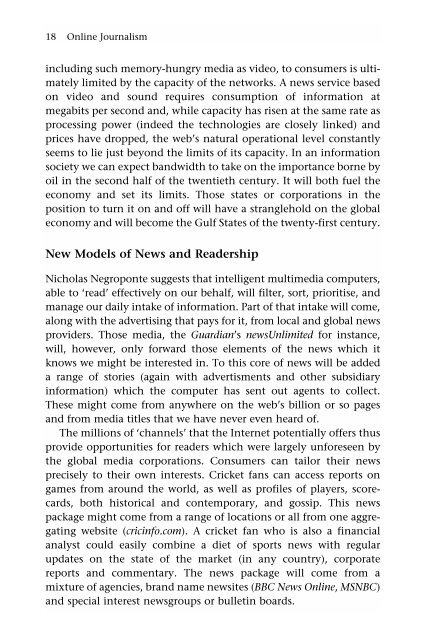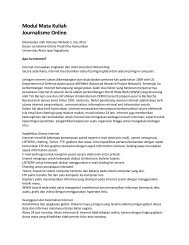Online Journalism - Ayo Menulis FISIP UAJY
Online Journalism - Ayo Menulis FISIP UAJY
Online Journalism - Ayo Menulis FISIP UAJY
Create successful ePaper yourself
Turn your PDF publications into a flip-book with our unique Google optimized e-Paper software.
18 <strong>Online</strong> <strong>Journalism</strong><br />
including such memory-hungry media as video, to consumers is ultimately<br />
limited by the capacity of the networks. A news service based<br />
on video and sound requires consumption of information at<br />
megabits per second and, while capacity has risen at the same rate as<br />
processing power (indeed the technologies are closely linked) and<br />
prices have dropped, the web’s natural operational level constantly<br />
seems to lie just beyond the limits of its capacity. In an information<br />
society we can expect bandwidth to take on the importance borne by<br />
oil in the second half of the twentieth century. It will both fuel the<br />
economy and set its limits. Those states or corporations in the<br />
position to turn it on and off will have a stranglehold on the global<br />
economy and will become the Gulf States of the twenty-first century.<br />
New Models of News and Readership<br />
Nicholas Negroponte suggests that intelligent multimedia computers,<br />
able to ‘read’ effectively on our behalf, will filter, sort, prioritise, and<br />
manage our daily intake of information. Part of that intake will come,<br />
along with the advertising that pays for it, from local and global news<br />
providers. Those media, the Guardian’s newsUnlimited for instance,<br />
will, however, only forward those elements of the news which it<br />
knows we might be interested in. To this core of news will be added<br />
a range of stories (again with advertisments and other subsidiary<br />
information) which the computer has sent out agents to collect.<br />
These might come from anywhere on the web’s billion or so pages<br />
and from media titles that we have never even heard of.<br />
The millions of ‘channels’ that the Internet potentially offers thus<br />
provide opportunities for readers which were largely unforeseen by<br />
the global media corporations. Consumers can tailor their news<br />
precisely to their own interests. Cricket fans can access reports on<br />
games from around the world, as well as profiles of players, scorecards,<br />
both historical and contemporary, and gossip. This news<br />
package might come from a range of locations or all from one aggregating<br />
website (cricinfo.com). A cricket fan who is also a financial<br />
analyst could easily combine a diet of sports news with regular<br />
updates on the state of the market (in any country), corporate<br />
reports and commentary. The news package will come from a<br />
mixture of agencies, brand name newsites (BBC News <strong>Online</strong>, MSNBC)<br />
and special interest newsgroups or bulletin boards.
















